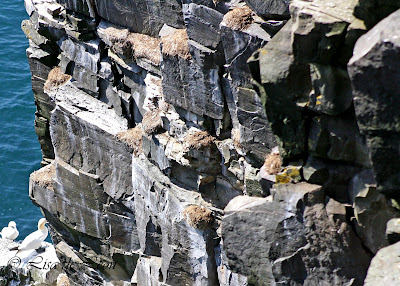 If you have been watching the news about the Gulf oil spill, you may have seen that the first bird covered with oil was a Northern Gannet. These birds winter in the Gulf Coast and return to Newfoundland in the Spring to breed. They are very striking with their coloring and their size. The shape of this bird is compared to a flying cross.
If you have been watching the news about the Gulf oil spill, you may have seen that the first bird covered with oil was a Northern Gannet. These birds winter in the Gulf Coast and return to Newfoundland in the Spring to breed. They are very striking with their coloring and their size. The shape of this bird is compared to a flying cross. I was at Cape Spear last weekend and spotted nine Gannets flying off the point. They should return by the thousands, and if they are smart, they should return soon! This shot was taking at Cape St. Mary's last September prior to their departure to the South. As you can see their young are quite big. This bird is touted to be the largest seabird of North America.
I was at Cape Spear last weekend and spotted nine Gannets flying off the point. They should return by the thousands, and if they are smart, they should return soon! This shot was taking at Cape St. Mary's last September prior to their departure to the South. As you can see their young are quite big. This bird is touted to be the largest seabird of North America. This shot shows the young in the downy state and in the molted darker state. Apparently, they only breed one brood a year. The young stay in the nest for 3 to 4 months . Cape St. Mary's is the only nesting grounds that I have visited where you can walk right to the edge of their breeding zone. It is very easy to get pictures of these birds, but difficult to isolate just one or two.
This shot shows the young in the downy state and in the molted darker state. Apparently, they only breed one brood a year. The young stay in the nest for 3 to 4 months . Cape St. Mary's is the only nesting grounds that I have visited where you can walk right to the edge of their breeding zone. It is very easy to get pictures of these birds, but difficult to isolate just one or two. Their nests are certainly no "Hilton." There appears to be a small patch of nesting material (probably dried grass taken from the hillside) just laid on the jagged edges of the cliff. It looks like the eggs would just roll off. Yet, judging by all of the young in the colony, they know what they are doing.
Their nests are certainly no "Hilton." There appears to be a small patch of nesting material (probably dried grass taken from the hillside) just laid on the jagged edges of the cliff. It looks like the eggs would just roll off. Yet, judging by all of the young in the colony, they know what they are doing. In this shot it looks like the young is resting on the nest and the adult is tucked in to protect the young. With the winds blowing so strong, it is a wonder the adult can hang on. We can only hope that these birds will return to our shores this year, safe and sound.
In this shot it looks like the young is resting on the nest and the adult is tucked in to protect the young. With the winds blowing so strong, it is a wonder the adult can hang on. We can only hope that these birds will return to our shores this year, safe and sound.